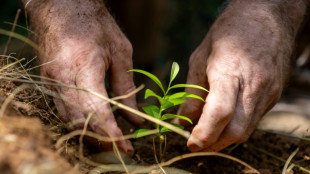
-
 Hostage families urge Israel to complete Gaza truce deal ahead of swap
Hostage families urge Israel to complete Gaza truce deal ahead of swap
-
UN warns worst may be yet to come if east DRC violence spreads

-
 Germany logs record US surplus amid Trump tariff fears
Germany logs record US surplus amid Trump tariff fears
-
'Irresponsible' or 'antiwar': US fighters in Ukraine grapple with Trump

-
 Rivals lurk as Vonn headlines world downhill
Rivals lurk as Vonn headlines world downhill
-
Smith digs Australia out of trouble in second Sri Lanka Test

-
 Emigration and war hit once-booming Belarus tech sector
Emigration and war hit once-booming Belarus tech sector
-
Hong Kong to file complaint with WTO over US tariffs

-
 Trump's Gaza plan derails Saudi-Israel ties: analysts
Trump's Gaza plan derails Saudi-Israel ties: analysts
-
Easterby makes two changes for 'significant challenge' of Scotland

-
 Third Al-Fayed brother accused of sexual abuse: BBC
Third Al-Fayed brother accused of sexual abuse: BBC
-
AI starts to help India's struggling farms

-
 Australia 85-2 after Sri Lanka strike early in second Test
Australia 85-2 after Sri Lanka strike early in second Test
-
Asian markets mixed ahead of key US jobs data

-
 Five facts about Kosovo: three flags, pop royalty and love of US
Five facts about Kosovo: three flags, pop royalty and love of US
-
James's 42 points lead Lakers over Warriors, Mavs top Celtics in NBA Finals rematch

-
 Mendis stranded on 85 as Australia bowl Sri Lanka out for 257
Mendis stranded on 85 as Australia bowl Sri Lanka out for 257
-
'Trump' thrills fans at Hong Kong theatre's last hurrah

-
 Hong Kong scientists fight to save fragrant incense trees
Hong Kong scientists fight to save fragrant incense trees
-
Mavericks top Celtics in NBA Finals rematch

-
 Bills' Allen wins NFL Most Valuable Player award
Bills' Allen wins NFL Most Valuable Player award
-
Taiwan says detects six Chinese balloons near island

-
 Tokyo world athletics party can make up for Olympic lock-out, says CEO
Tokyo world athletics party can make up for Olympic lock-out, says CEO
-
'Lottery ticket': Crypto investors brace for bumpy ride under Trump

-
 Most Asian markets rise ahead of key US jobs data
Most Asian markets rise ahead of key US jobs data
-
'Social Network' star Eisenberg slams Zuckerberg as 'obsessed with power'

-
 How to stop Barkley? Chiefs know they face ultimate test
How to stop Barkley? Chiefs know they face ultimate test
-
Baghdad's first skatepark offers boarders rare respite

-
 Convicted murderer executed in Alabama using nitrogen gas
Convicted murderer executed in Alabama using nitrogen gas
-
Trump, Swift join Super Bowl party as Chiefs chase 'three-peat'

-
 Barkley picks global lineup for NBA All-Star tournament
Barkley picks global lineup for NBA All-Star tournament
-
Big Tech's AI spending rattles markets

-
 Agronomics Limited Announces Meatly Launches First Cultivated Meat Dog Treat
Agronomics Limited Announces Meatly Launches First Cultivated Meat Dog Treat
-
Ohtani's ex-interpreter sentenced to nearly five years in betting-linked theft

-
 Madsen, Kupcho share lead at LPGA Founders Cup
Madsen, Kupcho share lead at LPGA Founders Cup
-
Rashford doesn't see football 'way I see it', says Amorim

-
 Kenya deploys additional 144 police to Haiti
Kenya deploys additional 144 police to Haiti
-
Liverpool 'too good' for sorry Spurs, says Postecoglou

-
 Trump trade nominee says universal tariffs worth considering
Trump trade nominee says universal tariffs worth considering
-
Trump sanctions ICC for 'illegitimate' Israel, US probes

-
 Torres treble powers Barca past Valencia into Copa del Rey semis
Torres treble powers Barca past Valencia into Copa del Rey semis
-
Judge pauses Musk plan for mass cull of US govt workers

-
 Liverpool thrash Spurs to reach League Cup final
Liverpool thrash Spurs to reach League Cup final
-
Fiorentina honour Bove by sweeping aside Inter Milan

-
 Rubio renews US hard line with Venezuela plane seizure
Rubio renews US hard line with Venezuela plane seizure
-
Amazon profits double, but cautious outlook disappoints

-
 Trump trade nominee floats universal tariffs
Trump trade nominee floats universal tariffs
-
Fighting global warming in nations' self-interest: UN climate chief

-
 British 'Netflix' conman gets six-year prison term in France
British 'Netflix' conman gets six-year prison term in France
-
It's all business for Eagles quarterback Hurts at Super Bowl


AI starts to help India's struggling farms
Each morning Indian farmer R Murali opens an app on his phone to check if his pomegranate trees need watering, fertiliser or are at risk from pests.
"It is a routine," Murali, 51, told AFP at his farm in the southern state of Karnataka. "Like praying to God every day."
Much of India's vast agricultural economy -- employing more than 45 percent of the workforce -- remains deeply traditional, beset by problems made worse by extreme weather driven by climate change.
Murali is part of an increasing number of growers in the world's most populous nation who have adopted artificial intelligence-powered tools, which he says helps him farm "more efficiently and effectively".
"The app is the first thing I check as soon as I wake up," said Murali, whose farm is planted with sensors providing constant updates on soil moisture, nutrient levels and farm-level weather forecasts.
He says the AI system developed by tech startup Fasal, which details when and how much water, fertiliser and pesticide is needed, has slashed costs by a fifth without reducing yields.
"What we have built is a technology that allows crops to talk to their farmers," said Ananda Verma, a founder of Fasal, which serves around 12,000 farmers.
Verma, 35, who began developing the system in 2017 to understand soil moisture as a "do-it-yourself" project for his father's farm, called it a tool "to make better decisions".
- Costly -
But Fasal's products cost between $57 and $287 to install.
That is a high price in a country where farmers' average monthly income is $117, and where over 85 percent of farms are smaller than two hectares (five acres), according to government figures.
"We have the technology, but the availability of risk capital in India is limited," said Verma.
New Delhi says it is determined to develop homegrown and low-cost AI, with Indian Prime Minister Narendra Modi to co-host an AI summit in France opening on Monday.
Agriculture, which accounts for roughly 15 percent of India's economy, is one area ripe for its application. Farms are in dire need of investment and modernisation.
Water shortages, floods and increasingly erratic weather, as well as debt, have taken a heavy toll in an industry that employs roughly two-thirds of India's 1.4 billion population.
India is already home to over 450 agritech startups with the sector's projected valuation at $24 billion, according to a 2023 report by the government NITI Aayog think tank.
But the report also warned that a lack of digital literacy often resulted in the poor adoption of agritech solutions.
- Buzzing -
Among those companies is Niqo Robotics, which has developed a system using AI cameras attached to focused chemical spraying machines.
Tractor-fitted sprays assess each plant to provide the ideal amount of chemicals, reducing input costs and limiting environmental damage, it says.
Niqo claims its users in Maharashtra and Andhra Pradesh states have cut their outlay on chemicals by up to 90 percent.
At another startup, BeePrecise, Rishina Kuruvilla is part of team that has developed AI monitors measuring the health of beehives.
That includes moisture, temperature and even the sound of bees -- a way to track the queen bee's activities.
Kuruvilla said the tool helped beekeepers harvest honey that is "a little more organic and better for consumption".
- State help -
But while AI tech is blossoming, takeup among farmers is slow because many cannot afford it.
Agricultural economist RS Deshpande, a visiting professor at Bengaluru's Institute for Social and Economic Change, says the government must meet the cost.
Many farmers "are surviving" only because they eat what they grow, he said.
"Since they own a farm, they take the farm produce home," he said. "If the government is ready, India is ready."
L.Adams--AT
